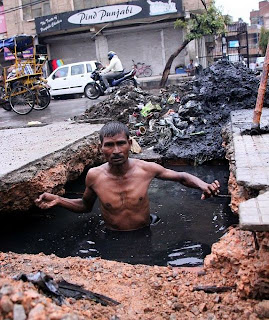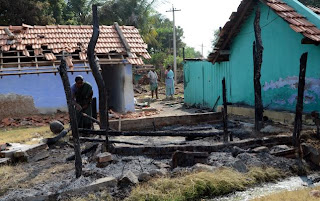Implement law as law!! Protect our right to dignified work!!
It is a national shame that even after 65 years of self-rule India has not eradicated manual scavenging. It still exists in rural and urban areas. In as early as 2007, the annual report of the Committee on the Elimination of Racial Discrimination of the UN expressed serious concern about the deplorable conditions of manual scavengers in India. Now the Union Government is trying to push through the Prohibition of Employment as Manual Scavengers and Their Rehabilitation Bill, 2012, under pressure from the Supreme Court. It is heartening that the practice of manual removal of human excreta will soon come to an end. But the need to enact a new bill arises because manual scavenging is an issue of human dignity and welfare and not merely sanitation, and the implementation of the 1993 Act by the Centre, and state governments has been proved dismal.
Manual scavenging has its roots in the social evils emanating from the centuries-old caste system and manual scavengers are denied their rightful opportunities of dignified work in India, a land of opportunities and destination for foreign investments. Perpetual discrimination, indifferent attitude of law enforcing authorities and the inadequacies in the existing law to wipe out the practice have been the reasons for the existence of this dehumanizing practice of untouchability. In India it is looked as an issue of sanitation rather than that of human dignity which constitution guarantees all its citizens. Manual scavengers predominantly belong to the Scheduled Castes and are subjected to additional discrimination and social exclusion based on untouchability. Abolition of untouchability is a Constitutional mandate and therefore, the onus of eradicating manual scavenging should rest on the state, on the Central and state governments equally. Manual scavenging is a social evil tantamount to atrocity on one or other section of the dalit/deprived sections of society. This practice was officially been banned in 1993 by the Government of India. Official lapses and apathy apart, surveys reveal that even now over 14 lakhs of scavengers are still suffering from stigma and nearly 90% of them are women. The States have not taken the act of abolition of this practice seriously and even till 2000 many a States had not notified the act. It is in this light that Supreme Court has given a clarion call for abolition of this atrocity.
The present Bill asserts that the practice of manual scavenging will attract a fine of Rs 50,000 or/and imprisonment up to a year and the practice of hazardous cleaning of sewers and septic tanks will attract a fine of Rs 2 lakh and up to 2 years of imprisonment. But the existing law – The Employment of Manual Scavengers and Construction of Dry Latrines (Prohibition) Act, 1993 – in the past 19 years that it has been in force has not seen a single conviction. First and foremost, the Bill should address the issue as one of human dignity rather than mere sanitation. The government itself was reluctant in enforcing the law against manual scavenging, being at times itself a violator and the hope of implementing another Bill effectively will add to the abysmal record of implementing the ban on manual scavenging. Rehabilitation has been included but it doesn’t specify who is accountable for the rehabilitation. As manual scavenging is an offshoot of untouchability practiced in India, persons or institutions that employ manual scavengers must be booked under SC-ST prevention of Atrocities Act. Corporations must be made accountable and be prosecuted for their failure to eliminate manual scavenging and threatening the scavengers who we have been subjugated for years. The implementation of the law should include rehabilitation of over two lakh manual scavengers, in the form of training for other livelihood options, provisions of subsidy and concessional loans for at least one member of the family and financial assistance for building a house. Rather than seeking to broaden the definition of manual scavengers, the Bill should also fix the responsibility on local governments for ensuring sanitary community toilets to replace unsanitary and manually-serviced toilets. The law should be strictly followed in letter and spirit.
It is a national shame that even after 65 years of self-rule India has not eradicated manual scavenging. It still exists in rural and urban areas. In as early as 2007, the annual report of the Committee on the Elimination of Racial Discrimination of the UN expressed serious concern about the deplorable conditions of manual scavengers in India. Now the Union Government is trying to push through the Prohibition of Employment as Manual Scavengers and Their Rehabilitation Bill, 2012, under pressure from the Supreme Court. It is heartening that the practice of manual removal of human excreta will soon come to an end. But the need to enact a new bill arises because manual scavenging is an issue of human dignity and welfare and not merely sanitation, and the implementation of the 1993 Act by the Centre, and state governments has been proved dismal.
Manual scavenging has its roots in the social evils emanating from the centuries-old caste system and manual scavengers are denied their rightful opportunities of dignified work in India, a land of opportunities and destination for foreign investments. Perpetual discrimination, indifferent attitude of law enforcing authorities and the inadequacies in the existing law to wipe out the practice have been the reasons for the existence of this dehumanizing practice of untouchability. In India it is looked as an issue of sanitation rather than that of human dignity which constitution guarantees all its citizens. Manual scavengers predominantly belong to the Scheduled Castes and are subjected to additional discrimination and social exclusion based on untouchability. Abolition of untouchability is a Constitutional mandate and therefore, the onus of eradicating manual scavenging should rest on the state, on the Central and state governments equally. Manual scavenging is a social evil tantamount to atrocity on one or other section of the dalit/deprived sections of society. This practice was officially been banned in 1993 by the Government of India. Official lapses and apathy apart, surveys reveal that even now over 14 lakhs of scavengers are still suffering from stigma and nearly 90% of them are women. The States have not taken the act of abolition of this practice seriously and even till 2000 many a States had not notified the act. It is in this light that Supreme Court has given a clarion call for abolition of this atrocity.
The present Bill asserts that the practice of manual scavenging will attract a fine of Rs 50,000 or/and imprisonment up to a year and the practice of hazardous cleaning of sewers and septic tanks will attract a fine of Rs 2 lakh and up to 2 years of imprisonment. But the existing law – The Employment of Manual Scavengers and Construction of Dry Latrines (Prohibition) Act, 1993 – in the past 19 years that it has been in force has not seen a single conviction. First and foremost, the Bill should address the issue as one of human dignity rather than mere sanitation. The government itself was reluctant in enforcing the law against manual scavenging, being at times itself a violator and the hope of implementing another Bill effectively will add to the abysmal record of implementing the ban on manual scavenging. Rehabilitation has been included but it doesn’t specify who is accountable for the rehabilitation. As manual scavenging is an offshoot of untouchability practiced in India, persons or institutions that employ manual scavengers must be booked under SC-ST prevention of Atrocities Act. Corporations must be made accountable and be prosecuted for their failure to eliminate manual scavenging and threatening the scavengers who we have been subjugated for years. The implementation of the law should include rehabilitation of over two lakh manual scavengers, in the form of training for other livelihood options, provisions of subsidy and concessional loans for at least one member of the family and financial assistance for building a house. Rather than seeking to broaden the definition of manual scavengers, the Bill should also fix the responsibility on local governments for ensuring sanitary community toilets to replace unsanitary and manually-serviced toilets. The law should be strictly followed in letter and spirit.

